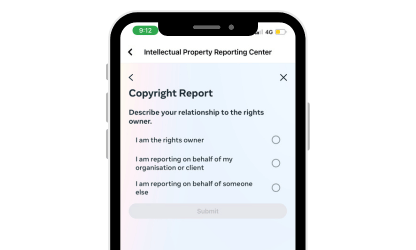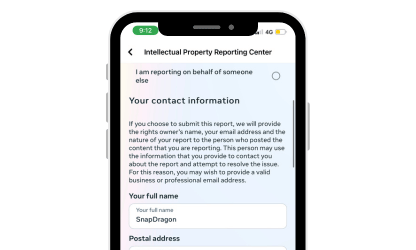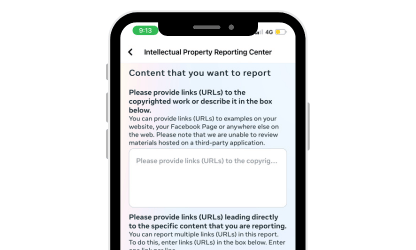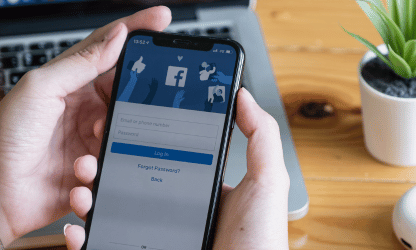Finding abuses of your intellectual property (IP) on social media can be hugely frustrating, and instances are on the rise with frequent scams on Facebook Marketplace and the launch of Facebook Shops.
What Is Intellectual Property?
Intellectual property refers to creations of the mind, such as inventions, literary and artistic works, designs, symbols, names, and images used in commerce. This valuable intangible property is protected by laws that grant exclusive rights to its creators or owners to use and profit from their creations.
There are several types of intellectual property rights, including patents for inventions, trademarks for brand names and logos, copyrights for literary and artistic works, and trade secrets for confidential business information. Intellectual property laws assist brands, creators and businesses in maintaining the value of their creations and preventing others from profiting off of their hard work.
IP Infringement and Social Media
Intellectual property infringement on social media platforms has become a common issue in recent years. With the ease of sharing and reposting content on these platforms, it has become increasingly difficult for creators to protect their work from being used without permission.
Copyright Infringement
One of the most common forms of intellectual property infringement is the unauthorised use of copyrighted material. Copyright infringement on social media is a significant concern due to the platforms having a vast user base and the ease of sharing multimedia content. Users often post images, videos, music, and articles without proper authorisation from the copyright owner, leading to unauthorised distribution of copyrighted material. This can include photos, videos, music, and written content that is used without the creator’s permission. In many cases, individuals or businesses will repost or share content without giving credit to the original creator, essentially claiming it as their own.
Brands and businesses should ensure they have robust copyright protection measures in place to prevent their work being misused.
Trademark Infringement
Abuse of IP rights can also take the form of trademark infringement. Trademark infringement occurs when a party uses a trademark that is identical or confusingly similar to a registered trademark owned by another party, without permission, in a way that is likely to cause confusion among consumers about the source or origin of goods or services.
This unauthorised use can dilute the distinctive quality of the trademark, harm the reputation of the brand, and mislead consumers. Owners of registered trademarks can protect their rights by registering their trademarks with relevant authorities and actively monitoring the market for potential infringements.
In addition to reporting infringements on social media platforms, creators and businesses can also take legal action against those who have unlawfully used their intellectual property. This may involve sending cease and desist letters, filing a lawsuit for damages, or seeking an injunction to stop further use of copyrighted material.
It is important for creators and businesses to actively monitor social media platforms for any instances of IP infringement. This can be done by conducting regular searches for copyrighted material, trademarks, or brand names to ensure that no one is using them without permission. Additionally, setting up alerts or notifications for mentions of your brand or content can help catch potential infringements early on.
How to Report IP Infringement on Facebook
Facebook Marketplace and Facebook Shops have become breeding grounds for IP infringement, with scammers taking advantage of the platform’s reach and ease of use. Sellers may list counterfeit goods, products using stolen designs or logos, or even falsely claim ownership of a particular product or brand. These scams not only harm the original creators or brands but also deceive consumers who may unknowingly purchase fake or infringing products.
If you do come across instances of IP infringement on Facebook, there are steps you can take to address the issue. The first step is to contact the individual or business using your content without permission and request that they remove it. If they refuse or do not respond, you can report the infringement to Facebook through their intellectual property reporting tool.
Facebook takes IP infringement seriously and will investigate reports of unauthorised use of copyrighted material or trademarks . If Facebook determines that a violation has occurred, they may remove the content or disable the account of the infringing party.
Fortunately, they do have a simple process for reporting copyright and trademark infringements.
Here is our step-by-step guide.
Step 1: Go to Facebook’s online reporting form

First, you will need to let them know what is being infringed. If it’s your photographs, literary works, music or artwork for example, select copyright. If they have stolen your registered intellectual property, for example your logo, brand name or strapline, select trademark.
Step 2: Complete your contact information

It is important to note, that only the IP owner or a representative can file a report, and you will be asked to clarify who you are. You will need details of who the owner is, and where they are based.
Also important to note, is that the person who posted the infringing content will be notified, and may be supplied with your name, contact details, and contents of the report – so you may want to provide a generic company email. Alternatively, you may consider reaching out to the poster personally, before going through Facebook’s official process.
Here, you should also provide proof that you own the copyrighted work by providing links to your website, or wherever you host the content that is being infringed (social media etc).
Step 3: Provide details of the content you want to report

Next you will need to detail the content, and how it infringes on your intellectual property rights.
When you spot violating content, make sure you take note of:
- The type of content you are reporting, e.g. a photo, video or advert
- A link to the content
- The name of the poster
- A description of the content, and where it can be found
- A screenshot of the content
Provide as much detail as you can on the content you are reporting, and how it infringes on your copyright or trademarks. This will prevent any delays in having the offending content removed.
If you are reporting a trademark infringement, you will be asked to provide your trademark registration number, and it is often useful to attach your certificate, or a screenshot of your certificate.
You will then be asked to provide an electronic signature before submitting your report.
What happens next?
After you have submitted your form, you will receive a confirmation email providing the details of your report and a unique reference number – make sure you take note of this in case you need to check on the status of your report.
If they require more information to progress, you will receive an email from Facebook explaining where they may need some clarity. This is why providing as much detail as possible in your report is important.
If Facebook decides to remove the reported content, you will be notified along with the content poster. The poster then has the right to appeal the removal of the content, and they may contact you directly to discuss the matter.
What if this seems like too much work?
We know that keeping on top of online fakes can be draining, time-consuming and frustrating. At SnapDragon, brand protection is our day job, and we defend our clients day-in-day out from online fakes on social media, e-commerce and the web. With our AI–powered software and talented multi-lingual team we detect, report and take down the fakes – protecting your revenue, reputation and customers. For more information or a free demo, get in touch today.
FAQs
Intellectual property refers to creations of the mind, such as inventions, literary and artistic works, designs, symbols, names, and images used in commerce. These creations are protected by law through patents, copyrights, trademarks, and trade secrets. But who actually owns intellectual property?
In general, the creator or author of a work is considered the owner of the intellectual property rights associated with that work. For example, if you write a book, you would own the copyright to that book. However, in some cases, intellectual property rights may be transferred or assigned to another party through agreements or contracts.
It is important to properly document and protect your intellectual property rights to prevent infringement and unauthorised use by others. Seek legal advice or consult with an IP protection expert for guidance on how to best protect your creations.
While it is not always considered a criminal offense, depending on the severity and intent of the infringement, it can certainly be classified as such.
In many cases, intellectual property theft falls under civil law rather than criminal law. Civil suits can be brought against individuals or companies who are found to be infringing on another party’s intellectual property rights. Civil penalties may include monetary damages, injunctions to stop the infringement, and other remedies.
However, in some cases, intellectual property infringement can rise to the level of a criminal offense. For example, if someone intentionally counterfeits goods or pirated copyrighted material for commercial gain, they could face criminal action. Penalties for criminal intellectual property infringement may include fines, imprisonment, and other penalties.





